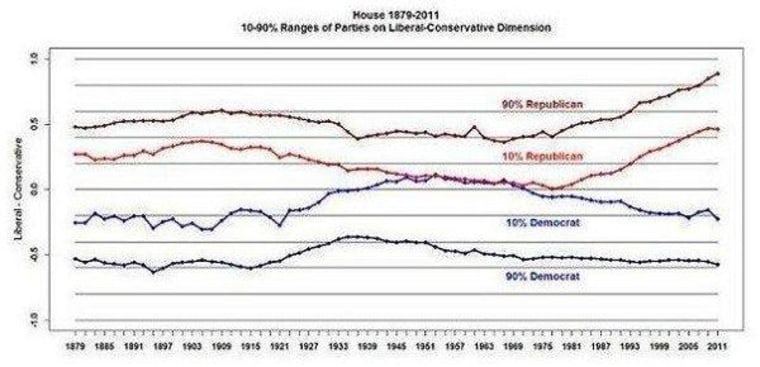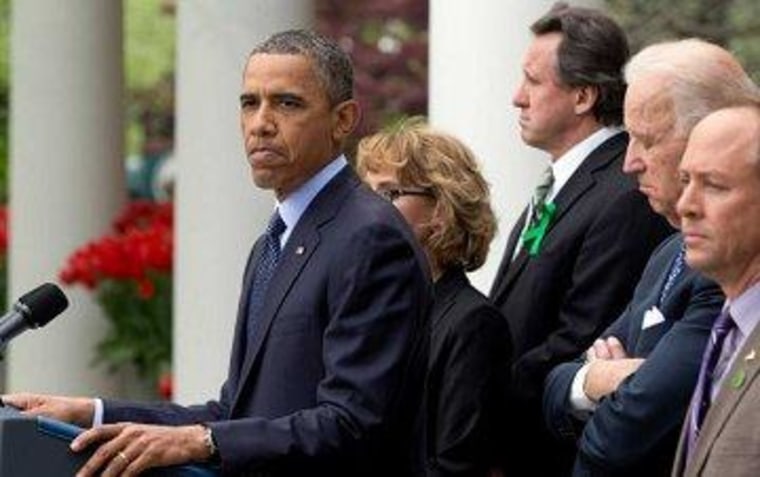In the wake of the massacre at Sandy Hook Elementary in December, President Obama decided to ignore the political risks and long odds of legislative success, and dove into the debate to reduce gun violence. He created a task force, led by Vice President Biden, which helped shape a detailed agenda -- ahead of schedule -- intended to save lives.
Obama proceeded to invest quite a bit of capital into the fight, including the issue in his inaugural address, hosting several public events, taking his message to the public and the media, and reaching out to lawmakers directly, urging them to do the right thing.
In the end, it wasn't enough. As we discussed yesterday, Republicans opposed gun reforms; Republicans lied about gun reforms; Republicans partnered with extremists against gun reforms; Republicans filibustered gun reforms; and last week, Republicans killed gun reforms.
And now the Beltway crowd is expressing its disappointment ... by blaming Obama.
Maureen Dowd offered a high-profile example the over the weekend, but the meme is spreading. The New York Times has an analysis piece today, connecting the defeat of the gun bill with the president's reluctance to "twist arms." John Dickerson has a piece in Slate today on the death of the legislation and Obama's clumsy legislative prowess, though the article neglected to even mention the word "Republican" in passing.
I realize overly simplistic answers to complex questions can be unsatisfying and at times incomplete, but last week's developments were fairly straightforward: Republicans opposed new gun laws, so the legislation died. There wasn't anything the president could do about it.
This wasn't about schmoozing or arm-twisting. It had nothing to do with a movie Maureen Dowd liked or the "tone" of the White House's message. Yes, there were some red-state Democrats who balked, but it wasn't their filibuster, and even if they'd voted with the majority, it wouldn't have been enough to overcome GOP opposition.
There's no denying that the legislative outcome represents a defeat for the president -- he fought for a bill that failed -- but to blame him is to overlook every relevant detail of what actually happened.
Greg Sargent highlights the exasperating Green Lantern Theory of Presidential Power, that suggests a president can get his or her way simply through effective use of the office's influence.
The simple truth is that the Republican Party -- and the 60 vote Senate -- are the prime culprits in the killing of Toomey-Manchin. No amount of Green Lantern theorizing can obscure what happened here.
I think some of the misapplied blame is the result of mistaken institutional assumptions. As we talked about last week, many like to think the president -- any president, really -- is ultimately responsible for all political progress or the lack thereof. Indeed, Americans like to think of their president as the most powerful person on the planet. POTUS is the Leader of the Free World and the Commander in Chief. He's the Top Dog, the Big Cheese, the Head Honcho, the One in Charge, and the one with whom the buck stops.
So when popular legislation the president supports dies, the assumption is that it must be the president's fault -- he's the leader, and if the guy in charge isn't getting what he wants, he must bear responsibility.
Except, the American system of government doesn't work this way. The president is powerful, but the office has limits -- the White House doesn't give dictation to the legislative branch, and a president is not the head of the opposition party that wants to see him fail.
I'd like the folks holding Obama responsible to consider a look at the recent past. In 2009 and 2010, the White House and Congress successfully approved the Recovery Act, a health care reform law 100 years in the making, Wall Street reform, DADT repeal, student loan reform, New START ratification, credit card reforms, and food-safety reforms. Are those inclined to blame Obama for gun reform's failure prepared to argue that the president simply forgot how to twist arms in 2011? That he knew how to persuade lawmakers before, but the skill suddenly vanished?
Or is it more likely that congressional Republicans changed the game after the 2010 midterms?
I also believe there's an ongoing reluctance among many to appreciate the scope of Republican radicalization. For many, especially in media, there's an assumption that there are two major, mainstream political parties -- one center-left, the other center-right -- and an effective president can govern through competent bipartisan outreach.
Those assumptions are wrong. As we discussed in January, outreach doesn't work because Republicans have reached an ideological extreme unseen in modern American history. It's a quantifiable observation, not a subjective one. Even if GOP policymakers were inclined to work with Obama, they realize that they'd be punished soon after by a primary challenge -- and they know this to be true because it's happened more than a few times in recent years (look up names like Crist, Specter, Bennett, Lugar, etc.).
Let's return to the thesis presented by Tom Mann and Norm Ornstein: "[W]e have no choice but to acknowledge that the core of the problem lies with the Republican Party."
The GOP has become an insurgent outlier in American politics. It is ideologically extreme; scornful of compromise; unmoved by conventional understanding of facts, evidence and science; and dismissive of the legitimacy of its political opposition.When one party moves this far from the mainstream, it makes it nearly impossible for the political system to deal constructively with the country's challenges."Both sides do it" or "There is plenty of blame to go around" are the traditional refuges for an American news media intent on proving its lack of bias, while political scientists prefer generality and neutrality when discussing partisan polarization. Many self-styled bipartisan groups, in their search for common ground, propose solutions that move both sides to the center, a strategy that is simply untenable when one side is so far out of reach.
There may have been a time a president could cajole rivals, but until recent years, presidents didn't have to deal with an entire political party that, statistically speaking, is the most ideologically extreme since the dawn of the modern American party system.

On guns, the president leveraged public opinion, accepted compromises, activated his electoral operation, and remained focused on achievable, popular, mainstream goals. The Republican filibuster prevailed anyway.
The Beltway doesn't have to like this series of events, but it's what happened.
